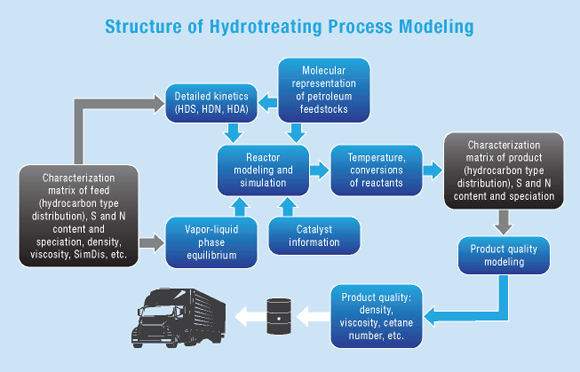ARCHIVED - Process Modelling Stimulation and Optimization
Information Archived on the Web
Information identified as archived on the Web is for reference, research or recordkeeping purposes. It has not been altered or updated after the date of archiving. Web pages that are archived on the Web are not subject to the Government of Canada Web Standards. As per the Communications Policy of the Government of Canada, you can request alternate formats. Please "contact us" to request a format other than those available.
Process modeling and simulation can help refineries improve hydrotreating performance and reduce energy consumption by optimizing operating conditions, hydrotreating unit configurations and catalyst utilizations. It can also help upgraders and refiners accurately predict product quality as the feedstocks and operating conditions change.
The figure below illustrates a schematic exemplifying the flow of information into and out of the Hydrotreating Process Model. Information gained from the model outputs are then used to modify existing or to create new procedures to improve current hydrotreating processes without building costly pilot plant engineering and development equipment.
The current research focus is on petroleum distillates hydrotreating. The content level of sulphur, nitrogen and aromatics is very high in middle distillates derived from oil sands and bitumen. The research modeling, which is currently being developed, provides a predictive tool in order to:
- facilitate the process design
- determine product yields, conversions, and hydrogen consumption
- control quality such as density, viscosity, cetane number, sulphur and nitrogen content for a very small fraction of the liquid
The process modeling and simulation program is divided into 2 areas:
- detailed modeling and simulation with a particular upgrading unit to provide the insight into the operations
- simulation of the whole bitumen upgrading or petroleum refining scheme to optimize plant-wide operation, product profile, energy and utility utilization
Currently, CanmetENERGY has the following research projects underway:
- methodology development to characterize petroleum feedstocks and products
- modeling and correlating diesel quality with its chemical composition
- detailed kinetics studies of hydrodesulphurization (HDS), hydrodenitrogenation (HDN), and hydrodearomatization (HDA)
- vapour-liquid equilibrium (VLE) studies during petroleum hydrotreating
- representation of petroleum fractions by molecular simulation

Page details
- Date modified: